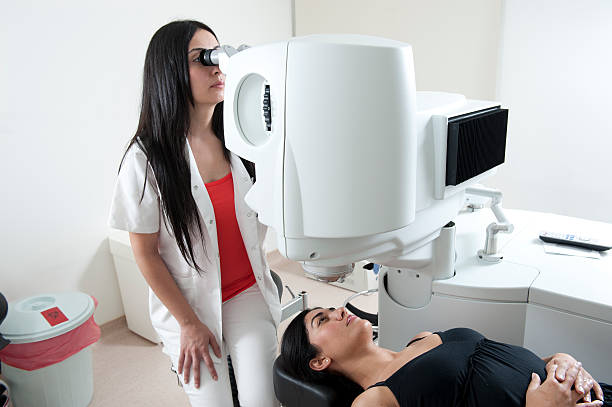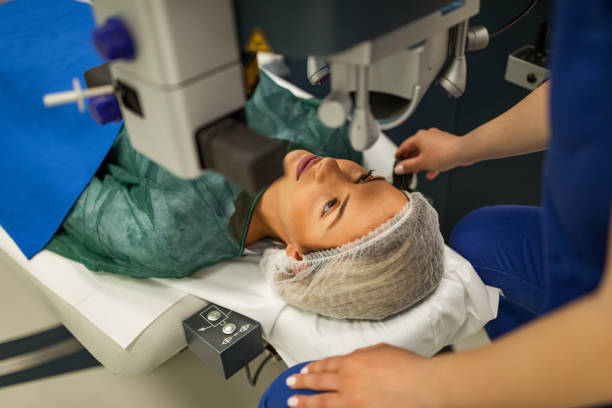Laser eye surgery has transformed the way millions of people see the world—literally. If you’re tired of relying on glasses or struggling with contact lenses, this popular procedure might offer a long-term solution. It can correct common vision problems like nearsightedness, farsightedness, and astigmatism. But is laser eye surgery the right choice for you? Understanding the risks, benefits, and if you’re a good candidate is the first step.
In this guide, we’ll explain what laser eye surgery is, how it works, and who it helps the most—so you can decide if it’s the right choice for your vision needs. You’ll learn about the different types of procedures, what to expect before and after surgery, and how it can improve your everyday life.
What Is Laser Eye Surgery?
Laser eye surgery is a fast and safe way to fix common vision problems like nearsightedness, farsightedness, and astigmatism. The most well-known type is LASIK (Laser-Assisted in Situ Keratomileusis), which uses a laser to reshape the cornea. But LASIK isn’t the only option—other methods like PRK and SMILE can also help, depending on your eyes and needs.
Types of Laser Eye Surgery
There are different types of laser eye surgery, and each one works a little differently. Your eye doctor will check your eyes and help choose the option that fits you best. What’s right for one person may not be right for another, so a full eye exam is key.
- LASIK – the most popular type of laser eye surgery. It offers clear vision with a fast recovery time, often within a day or two.
- PRK (Photorefractive Keratectomy) – a good choice for people with thinner corneas. It removes the outer layer of the eye before reshaping the cornea with a laser.
- SMILE (Small Incision Lenticule Extraction) – a less invasive option that uses a small laser incision. Unlike LASIK, it doesn’t create a flap in the cornea.
- LASEK – a blend of LASIK and PRK. It gently moves the outer layer of the eye instead of cutting a flap, making it a good choice for people with thin or flat corneas.
All these types of surgery work by reshaping the cornea—the clear, front part of your eye. This helps light focus better on the retina, which improves how you see.

How Does Laser Eye Surgery Work?
Laser eye surgery uses a precise laser to carefully reshape your cornea. By changing the shape of the cornea, the laser helps light enter your eye properly, allowing you to see clearly without glasses or contacts.
The entire laser eye surgery procedure usually takes less than 30 minutes. Most people start to see better within 24 hours, and vision often keeps improving over the next few days.
Who Is a Good Candidate?
Laser eye surgery isn’t right for everyone. But you might be a good match if you meet certain conditions. Here are a few signs that laser eye surgery could be a good fit for you:
- You are 18 or older
- Your vision hasn’t changed much in the last year
- You have healthy eyes (no infections or diseases)
- You are not pregnant or breastfeeding
- You don’t have very severe dry eyes
Important: Only a licensed eye surgeon can confirm if you’re a good candidate for laser eye surgery. This decision is made after a full eye exam and review of your health history.
Benefits of Laser Eye Surgery
Why do so many people choose laser eye surgery? It offers clear vision and long-term results. Here are some of the top benefits you should know:
- Enjoy clear vision without the need for glasses or contact lenses.
- Quick results – many people notice clearer vision within just 1 to 2 days after surgery.
- Fast healing time – most people recover quickly and can return to normal activities within a few days.
- No more hassle with foggy glasses or losing your contact lenses—enjoy clear vision without the daily struggle.
- Long-lasting effects – enjoy clear vision for many years, and in some cases, even for life.
Laser eye surgery can make everyday life easier. It’s especially helpful for people who play sports, travel a lot, or have active jobs where glasses or contacts can get in the way.
Risks and Side Effects
Like any surgery, laser eye procedures do have some risks. Most side effects are mild and go away on their own, but it’s important to know what to expect before you decide.
Common Side Effects
- Dry eyes
- Blurry or hazy vision for a few days
- Light sensitivity
- Halos or glare at night
Rare Risks
- Infection
- Flap problems (in LASIK)
- Vision not fully corrected
Most side effects can be treated easily, and serious problems are very rare. Still, it’s important to talk with your doctor about all possible risks before choosing laser eye surgery.
What to Expect Before, During, and After Surgery
Understanding what to expect before, during, and after surgery can help you feel more comfortable and confident about the whole process.
Before Surgery
- You’ll get a full eye exam
- Stop wearing contacts (for a few days or weeks)
- Don’t use eye makeup the day of surgery
- Arrange for someone to drive you home
During Surgery
- You’ll be awake but given numbing eye drops
- The laser reshapes your cornea in minutes
- You may feel slight pressure but no pain
After Surgery
- Rest your eyes for the first day
- Use eye drops as directed
- Avoid rubbing your eyes
- No swimming or heavy exercise for a few weeks
- Most people return to work within 2–3 days

Cost of Laser Eye Surgery
Laser eye surgery is a one-time cost that may save you money over the years. In the U.S., the average price is between $2,000 and $3,000 per eye, depending on the type of procedure and where you go.
Note: Most health insurance plans don’t cover laser vision correction since it’s seen as an elective, or optional, procedure. You’ll likely need to pay out of pocket.
However, many clinics offer:
- Monthly payment plans
- Financing options
- Discounts for military members or healthcare workers
Take time to compare prices, services, and reviews before picking a clinic. While cost matters, always put safety, experience, and the clinic’s reputation first.
How Long Do the Results Last?
In most cases, the results of laser eye surgery last for many years—and sometimes for life. Your eyes will still go through natural aging, so you might need reading glasses as you get older. Still, for distance vision, many people enjoy clear sight without glasses for decades.
Choosing the Right Eye Surgeon
Choosing a skilled and experienced surgeon is one of the most important steps for a safe and successful result. The right doctor can help lower risks and improve your chances of great vision.
What to Look For:
- Board certification
- High success rate
- Good reviews from past patients
- Clear explanation of the risks and steps
- Modern, up-to-date equipment
Tip: Don’t be afraid to ask questions, and never feel rushed during your visit. A good, trustworthy doctor will take the time to explain everything and make sure you feel at ease.
You can find certified refractive surgeons by searching trusted websites, such as the American Academy of Ophthalmology. These sites help you choose a qualified expert for your eye care.
Is It Worth It?
Many people say laser eye surgery is one of the best choices they’ve ever made. But it’s still a personal decision. To help you decide, here are a few questions to ask yourself:
- Am I comfortable with the cost?
- Do I meet the medical requirements?
- Do I want to stop wearing glasses or contacts?
- Am I okay with a few days of downtime?
If you said yes to most of these questions, it could be a good time to schedule a consultation and learn more about your options.
Real Stories from Real People
Hearing real stories from others can help you feel more confident and informed as you make your decision.
“After LASIK, I could see the stars at night—clearly—for the first time in years. It changed everything.” – Sarah M.
“I travel a lot for work, and ditching my contacts was such a relief.” – James K.
Reading more testimonials from trusted sources like WebMD or Mayo Clinic can give you a better idea of what to expect and how others felt about their laser eye surgery experience.

Pros and Cons at a Glance
Pros:
- Better vision without glasses or contacts
- Fast recovery
- High success rate
- Saves money long term
Cons:
- Not covered by most insurance
- Some side effects
- Not for everyone
- Rare but serious risks
Final Thoughts: Is Laser Eye Surgery Right for You?
Laser eye surgery gives millions of people freedom, convenience, and clear vision. If you’re tired of wearing glasses or contacts and meet the health guidelines, it could be the right solution for you.
Still not sure? That’s completely okay! The best thing you can do next is talk to a qualified eye surgeon. They can explain your options and help you choose what’s best for your eyes and your daily life.

